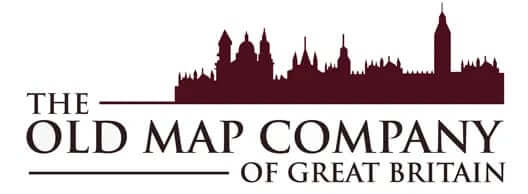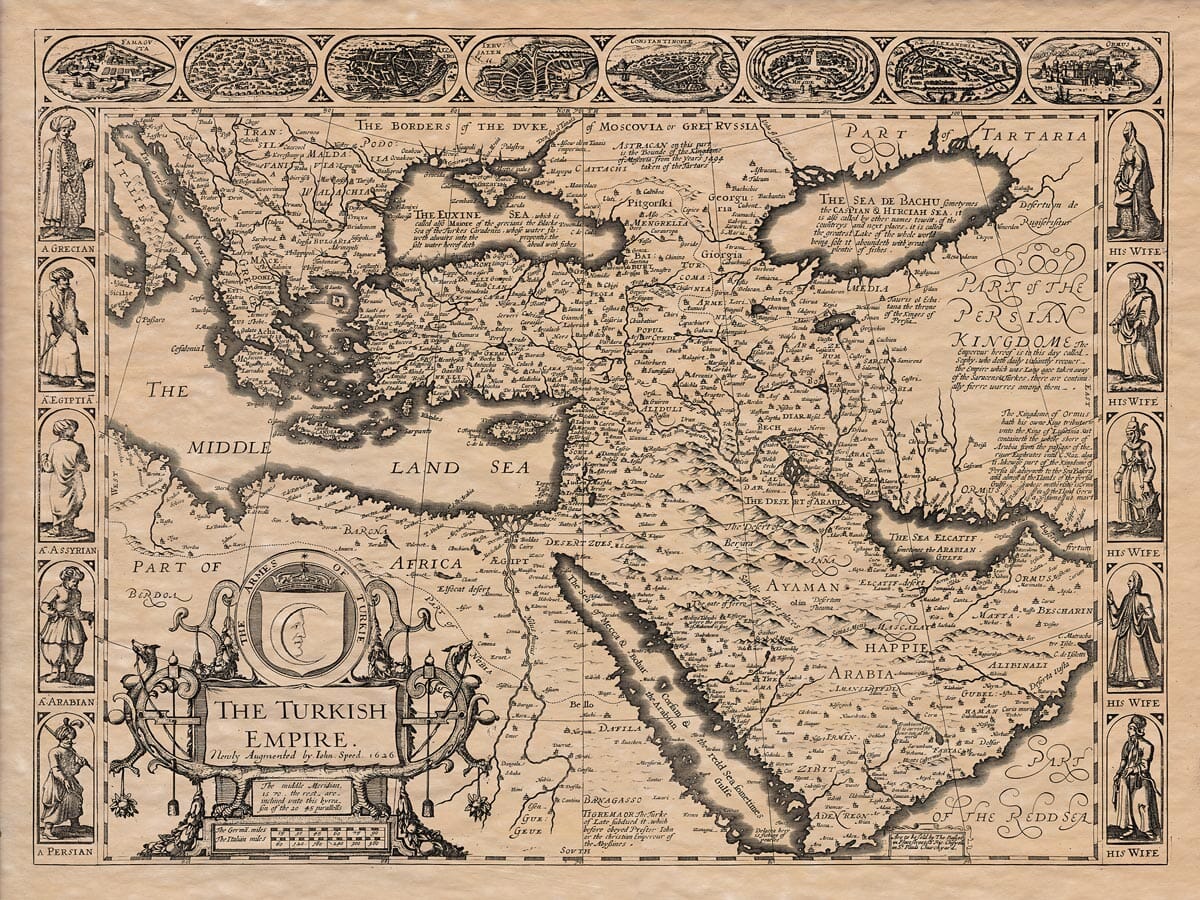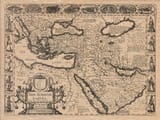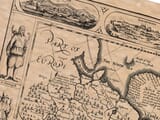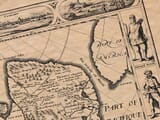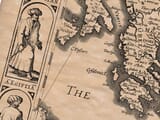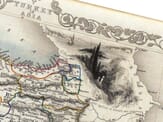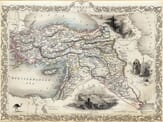Description
John Speed added historical notes on the back of his old map of Turkey (verso in map speak) which we have transcribed here. We’ve edited some old place names and certain old spellings and missing letters, etc. for clarity.
THE DESCRIPTION OF THE TURKISH EMPIRE
The Turk is admired for nothing more than his sudden advancement to so great an Empire. For before the last three hundred and odd years, we must seek this people (which is become now a terror to the whole world) lurking in the by-corners of Asia; like runagates and thieves, as indeed they were; such as so infested their neighbours with rapines and murders, that neither enjoyed their own lives freely, nor possessed more wealth than they could maintain with the sword.
(2) The great Othman was the first who redeemed them from obscurity: his predecessors were mentioned as a nation worth forty, and therefore it is not easy to give their true original, or the just place of earth from whence they sprang. There are who say from the Caspian mountains: and that in the time of the Macedonian Bishops they served the Saracens in the Indian wars, but turned their story to their advantage: for when they had once tried their strength, and found their forces sufficient in behalf of others, they bethought themselves at last to use them for their own advancement; and to that purpose turned head first upon their paramours, out of whose spoils they raised incredible armies, which overspread all Asia to the very Levant. Others again conjecture that they were a Scythian people; and the rather for that they made their way into these parts through Sarmatia and Cappadocia; and do on, as were it in a direct course from Scythia. The truth is, the customs of both are much alike, which fall very near; and their wars were waged with the same weapons and discipline.
(3) But admit their first attempt upon the Saracens: yet were they again scattered by their civil divisions, lived as before, and could not be recollected into a nation, till Othman took upon him to be their leader in the year 1300; a man of as low birth and fortunes as the meanest, but with a tumultuous spirit and an able wit to wield it, which put him upon this great action to conquer the world, and suffered him not to retire, till he had seated himself in an empire which his progeny to this day holds. He began with a small crew of such as were led on by want; and even rather to bear arms in defence of their private rights than with intent to invade an enemy: for he prepared not at first as an open warrior, but wrought his purpose by stratagems and sudden excursions upon such as were unprovided for defence; polled himself of mountains and woods as lay most convenient for his lurking practices, and whither he might retire safe if at any time he were pursued.
(4) By these means he was content for a while to increase his wealth and power; which soon grew to that eminency, as in few years he durst make a strong enemy to the face; buckle with him upon his own ground for his possessions; and at last so prevailed, whereso he set footing, that he scarce stepped back till he clapped into his own government Pontus and Cappadocia, Galatia and Bithynia, Pamphylia and Lycia, Lydia and Phrygia, all of them bordering the Greek seas: to which his successors have in later times added many other conquests of Asia, Africa, and Europe: so that now it is become the most potent and tyrannical Empire of the world.
(5) The first seat of state was at Prusa in Bithynia; from thence it was removed to Hadrianopolis; and at last to Constantinople, a city erected in the times of the Greek Emperors. The palace, called the Seraglio, is built in the most eminent part of the town, contains three miles in circuit within the walls, and surpasseth all other courts under Heaven for majesty and number of buildings, for pleasurable gardens, sweet fountains and rich furniture. The Emperor himself hath for his common guard 4,000 footmen, the sons of tributary Christians, who are called Janisaries, and their captain Aga, besides ten thousand others dispersed under several commanders through divers parts of the Empire, and fifteen thousand horse-men in ordinary pay. In their numbers I reckon not those multitudes of Timariots which are assigned to several of the Turkish state, and deliver yearly incredible sums of money into his treasury. As his wealth is great, so is his life luxurious: fifteen hundred women are cloistered up for his pleasure, and out of them one hundred and fifty are culled as choice for his daily lust. The offices within the court are most performed by Eunuchs, such as will neither share in nor reveal his unsatiate and brutish pleasures.
(6) The ministers of state are: (1) Muftis, who interpret their law and lay open their Alcoran with like authority as the Pope among the Roman-Catholicks. (2) Cadileschers, who are the supreme judges to determine their causes controverted; and these are three: the one for Europe, whose residence is in Romania; another for Asia in Natolia; and a third set up by Sinon the First to judge causes between the Arabs, for the buying of Egypt, Syria, Arabia, and part of Armenia. These Cadileschers have under them perpetual judges of every province, called Cadies, and are inferior to their places but continued by the Emperor himself. (3) The third rank are the Vizier Bashas, the Emperor’s council; the chief is Vizier Azam, a man of great power throughout all the dominions of the Turk; and for the most part they are Pashas. His treasurers of state. (4) The fourth order are the Beglerbegs, whose office answers almost to our Generals; and as the Judges were of old, are three, placed in the several quarters of the Empire: one in Greece for Europe; a second in Natolia for Asia; and the third is an Admiral of the Seas, and commands those parts which are held by the other two; all of equal respect and place with the Vizier Basha. The more inferior rank and petty employments in the commonwealth are almost innumerable; many of them are not natives, but apostate Christians, and in conditions differ as the countries from whence they first sprang.
(7) The multitude, I mean the born Turks, favour full of their barbarous ancestors, and carry the marks of it in their heads and limbs of Scythians and Tartars. They are for the most part broad-faced, strong-bodied, well-complexioned, and heavy-headed; of gross understanding, ill-disposed, and very greedy of wealth; luxurious in their diet, and beastly in their lustful affections without distinction of kindred or sex; base-minded, slaves to themselves and their superiors in their own country; yet ignorantly proud and contemptuous of other nations, which they take for foul, though embellished with their more civil inhabitants. They pass not to count a Christian in their course of traffic, nor are they bound to keep promise unless it make for their advantage. The greatest praise which they give their friend is strict obedience to their discipline: who are so industrious to it, that to one in their camp or march, in a night, there arise many thousands to surprise their enemies unawares, with so very little noise as to be heard in their approach. No difficulty can be esteemed at which they are not ready to perform, without any respect at all if there be danger in best rivers, strong mounts, safe walls, and sentinel. In brief, they care not to cast life in hand, but at full liberty, and are the terriblest military men upon earth.
(8) No great marvel then, if with so great multitudes, so well ordered, they daily improve their Empire upon the Christians, who are too remiss in defence of the truth against these misbelievers, bold and fool-hardy to uphold their false God. But the truth is, their superstitions are so full of fate, which they think immutably predestined, that every man holds his life for death, which he can neither defend nor hasten, and therefore makes them fearless to incur dangers and careless for their own hurt.
(9) Divers schools they have, where their chief study is their imperial laws: from thence the more are preferred for secular, some to ecclesiastick offices. Their religion is a mere cozenage, thrust upon the simple people by the impious subtlety of one Mahomet, whose story is well within our knowledge, and may cause us to commemorate the desperate estate of those ignorant, yet perverse and bloody anti christians.
(10) His place of birth is questioned, whether he were a Cyrenean, an Arabian, or Persian, it is not yet fully decided; certain enough he was of base parents; his father (some say) a worshipper of devils, and his mother a faithless Jew. By a sly train he went into the world: a practiser of magic (which none but two such religions could have made up) in the year 597. When he had been for a while thus instructed by his parents’ poverty, and to improve his fortunes, he removed from his native soil to live for a season with some professed Christians, where he received so much knowledge of the Word and light of the Gospel as to pervert it to his destruction and the ruin of many millions of souls.
(11) In his first adventurous travels abroad, he fell into the hands of thievish Saracens, who sold him to a Jewish merchant; and he employed him to drive his camels through Egypt, Syria, Palestine, and other foreign countries, where he still gathered further instructions of that truth which he intended to abuse. His wickedness first broke into fraud, upon theft, rapine, and other sins of the highest rank; in which he continued, and seduced others; till the death of his master, and after married his aged but rich mistress.
(12) He had means now to act his malicious purposes, and wealth to countenance his exceeding pride which would not be satisfied with a lower ambition than to be called a Prophet of God. This he began to practise by the counsel of one Sergius, a monk who, being cast out for heresy from Constantinople, betook himself into Arabia and joined with Mahomet to make up this mischief perfect; the two now their juggling. There wanted not craft betwixt them to make use of his worst actions to get the temple. For when by his debauched practices and gluttony he had fallen into an epilepsy, and in his beast-like grovelling and foaming upon the earth chanced what came, he feigned an ecstatic swoon wherein his soul was wrapped from his body, while conversing with Gabriel an angel from Heaven. To make this familiarity the more to be believed, he had bred up a dove to take her meat from his ear, which he most blasphemously professed to be the Holy Ghost, who at such times, and in that shape, inspired the prophecies which he was to preach. Lastly, when these things his wicked leaders had conceived and meant to propagate, they digested into a volume and called it the Alcoran.
(13) For this too they had a trick, that it might be seen he came both from Heaven into the hands of Mahomet: and to this purpose he had himself up to a tame bull, which by custom became familiar, that no sooner he heard the voice of his master, but he would straight run, calf the head in his lap, and use his wonted dalliance as with a fellow. Between the horns of this bull had he fastened the Alcoran, and conveyed him into a by-place, where when he had assembled the multitude at a set time to expect a wonderful miracle from heaven that might confirm his prophecy, the scene thus ordered, on the sudden he lifted up his voice and made a loud cry, which no sooner the beast heard, but he brake his way through the press, overturned many of the spectators, which now stood at a gaze, and gently laid his horns and book in the bosom of his false counter; which he with much ceremony and feigned reverence received, and in their presence opening the volume began to interpret the chief of their laws, which thereafter they were to observe.
(14) Circumcision he allowed, and with the old Law forbade swine’s flesh, that he might with more ease lead on such as were Jews: he further permitted them to be baptized by Sergius, that the Christians too might have no less inducements. Our Messiah and our Saviour he denied not to be great Prophets: but that neither party might emulate the greater observance of the other; and indeed especially that his own might seem new, and yet take place from both, he changed the circumcision of the Jews from the eighth day and all multiple baptizings, which are to be conferred but once for all, upon the false believer. For the like reason of difference with other nations and sects, he left both the Jews’ Sabbath and their circumcision dominical, and commanded his holy ceremonies to be celebrated on the Friday: for so it was when the bull delivered him his Alcoran. Before they enter the temple, they wash all the unclean parts of their bodies and then pray, which must be performed five times a day with the face toward the south. They have no man’s fast to come every year, but it is observed one day for a year they may, when the sun down redeem it with what gluttony they please. Wine is forbidden, only for a few that he might not seem to have loved that (which was his vanity to himself) had brought him into his epileptical fits. Briefly, what he knew would best agree with the brutish desires of the people, that he took order should be commanded as by God himself: to have many wives and as many concubines as they could maintain for their bliss after this life; propound no invisible delights nor other research after understanding, but proportioned to each of their sensual thoughts, and promise of the world whose joys knew no parallel of felicity and no check or change to the body itself. To the covetous, wealth; to the ambitious, honours; to the gluttons, meats; to the virgins, rich attire and embraces of angels; the poor souls were so fitted. And when he had thus for a long time discoursed over his Alcoran, he took a year’s scruple and set it upon the bull’s neck, as it were foretold by an infallible truth, by his words, that whosoever could take the bull, it should be enough to declare the man as one sent from God.
(15) This bold piece of miracles the gapers believed at pause, so that in an instant they cried up his lying, and held his companion in reputation of a true prophet; called themselves Mahometans, true believers, which the Turk still affects, rather than his right name of Turks, which infers barbarism and upbraids him with the neglect of his original.
(16) And now he had got the difficulty of his attempt, a fit matter to draw on millions of followers, such as would take like religion and build haste not their pleasures. Yet fate met with and overthrew his beginning: for he was poisoned by some of his own family.
(17) He had long before prophesied that he should be wonderfully conveyed to Heaven: and to make good this fraud, had framed an iron chest for his sepulchre, which he purposed the beholders to believe of pure load-stone, placed in the top of the temple, and by this means appeared to the choice of men to hang in the air. But the stratagem (it seems) was prevented by death: yet they expect still his ascent from the dead; till then each year they celebrate his nativity with great solemnity in Mecca, a city of Persia, and it is visited by the Turks as the Sepulchre of our Saviour at Jerusalem is hallowed by pilgrim Christians.
(18) I took leave here to supply the room with the customs and religion of the Turks, which, in course of our former method, was due to the division of the Empire and her several provinces: but I suppose I have the less trespassed, in regard that most of these are already had their head of description in each of their particular kingdoms to which they did formerly belong. It will suffice then here to name them, and refer to the map, where you have them more at large.
(19) In Europe it lies along the sea-coast of the Adriatic bay, from the land of Epidaurum near Ragusa, and so into the Aegean Sea and Propontis, and a great part of the Euxine to the city Theodosia in the Taurica Chersonesus, which is now called Caffa. In the Mediterranean from Jerusalem in Hungary to Constantinople in Greece. The several provinces of this compass are: (1) a great part of Hungary, Bosnia, Servia, Rascia, Bulgaria, Wallachia and Transylvania, &c., in the Description of Hungary. (2) Greece and her provinces, Thracia, Macedonia, Epirus, Achaia, Peloponnesus, and the islands of the Aegean, in the Description of Greece. (3) A part of Sclavonia, described in the Description of Dalmatia.
(20) In Africa almost all the sea-coast, from the city Barca by the Garamantes to the Arabic bay: in this stands Algiers, Tunis, Tripolis, all Egypt, Fez, Morocco, &c., according to their description.
(21) In Asia, Natolia, the island of Cyprus, all Syria, Palestine, Judea, Coelosyria, Phoenicia, Babylonia, Arabia propria, Turcomania, and Georgia, Mesopotamia, and a part of Media. And these belong to the Description of Asia.
